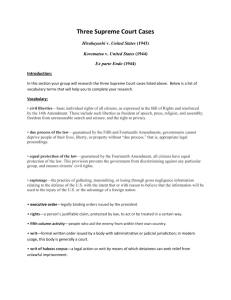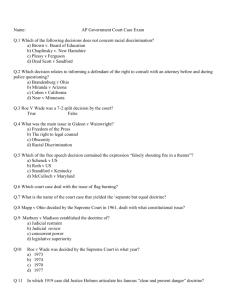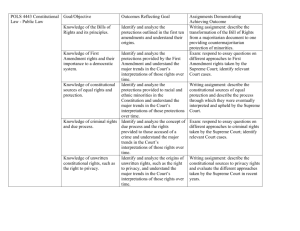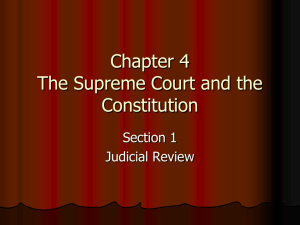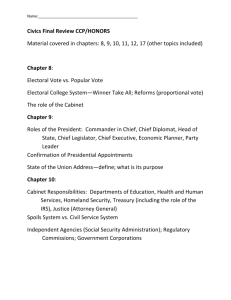AP Government * Summer Assignment
advertisement
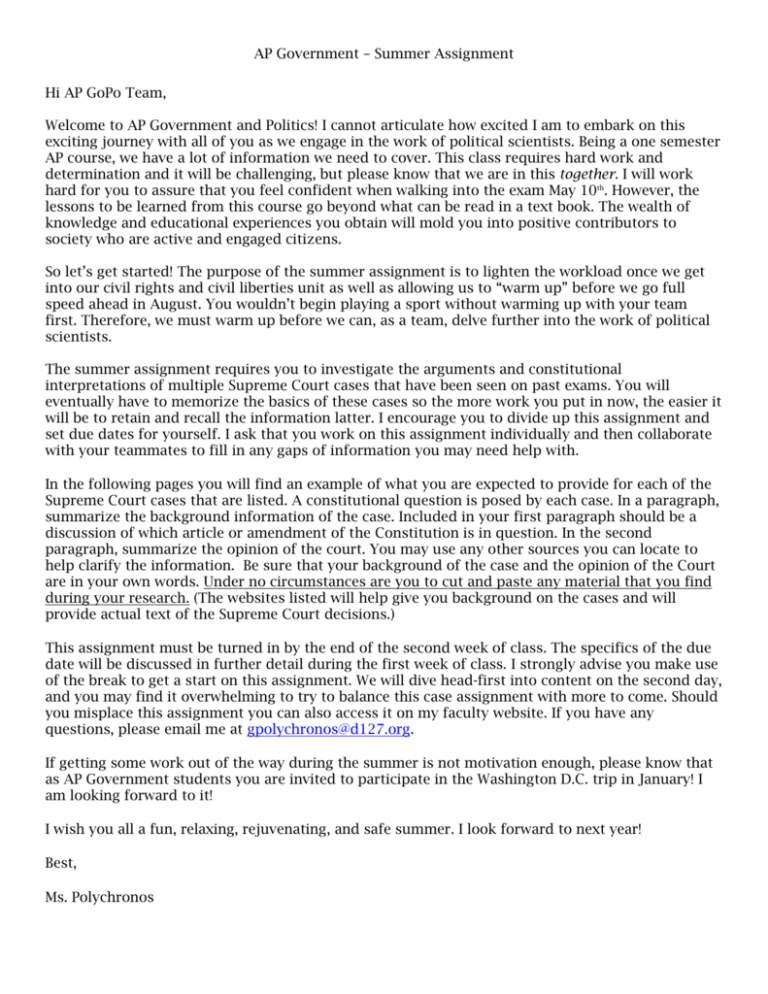
AP Government – Summer Assignment Hi AP GoPo Team, Welcome to AP Government and Politics! I cannot articulate how excited I am to embark on this exciting journey with all of you as we engage in the work of political scientists. Being a one semester AP course, we have a lot of information we need to cover. This class requires hard work and determination and it will be challenging, but please know that we are in this together. I will work hard for you to assure that you feel confident when walking into the exam May 10th. However, the lessons to be learned from this course go beyond what can be read in a text book. The wealth of knowledge and educational experiences you obtain will mold you into positive contributors to society who are active and engaged citizens. So let’s get started! The purpose of the summer assignment is to lighten the workload once we get into our civil rights and civil liberties unit as well as allowing us to “warm up” before we go full speed ahead in August. You wouldn’t begin playing a sport without warming up with your team first. Therefore, we must warm up before we can, as a team, delve further into the work of political scientists. The summer assignment requires you to investigate the arguments and constitutional interpretations of multiple Supreme Court cases that have been seen on past exams. You will eventually have to memorize the basics of these cases so the more work you put in now, the easier it will be to retain and recall the information latter. I encourage you to divide up this assignment and set due dates for yourself. I ask that you work on this assignment individually and then collaborate with your teammates to fill in any gaps of information you may need help with. In the following pages you will find an example of what you are expected to provide for each of the Supreme Court cases that are listed. A constitutional question is posed by each case. In a paragraph, summarize the background information of the case. Included in your first paragraph should be a discussion of which article or amendment of the Constitution is in question. In the second paragraph, summarize the opinion of the court. You may use any other sources you can locate to help clarify the information. Be sure that your background of the case and the opinion of the Court are in your own words. Under no circumstances are you to cut and paste any material that you find during your research. (The websites listed will help give you background on the cases and will provide actual text of the Supreme Court decisions.) This assignment must be turned in by the end of the second week of class. The specifics of the due date will be discussed in further detail during the first week of class. I strongly advise you make use of the break to get a start on this assignment. We will dive head-first into content on the second day, and you may find it overwhelming to try to balance this case assignment with more to come. Should you misplace this assignment you can also access it on my faculty website. If you have any questions, please email me at gpolychronos@d127.org. If getting some work out of the way during the summer is not motivation enough, please know that as AP Government students you are invited to participate in the Washington D.C. trip in January! I am looking forward to it! I wish you all a fun, relaxing, rejuvenating, and safe summer. I look forward to next year! Best, Ms. Polychronos AP Government – Summer Assignment Case Resources: http://straylight.law.cornell.edu/supct/index.html http://lp.findlaw.com http://www.Oyez.com -----------------------------------------------------------------------------------Case Example: Marbury v. Madison Background information: In his last few hours in office, President John Adams made a series of “midnight appointments” to fill as many government posts as possible with Federalists. One of these appointments was William Marbury as a federal justice of the peace. However, Thomas Jefferson took over as President before the appointment was officially given to Marbury. Jefferson, a Republican, instructed Secretary of State James Madison to not deliver the appointment. Marbury sued Madison to get the appointment he felt he deserved. He asked the Court to issue a writ of mandamus, requiring Madison to deliver the appointment. The Judiciary Act, passed by Congress in 1789, permitted the Supreme Court of the United States to issue such a writ. Constitutional Question: Does the Supreme Court of the United States have the power, under Article III, Section 2, of the Constitution, to interpret the constitutionality of a law or statute passed by Congress? Opinion: The Court decided that Marbury’s request for a writ of mandamus was based on a law passed by Congress that the Court held to be unconstitutional. The Court decided unanimously that the federal law contradicted the Constitution, and since the Constitution is the Supreme Law of the Land, it must reign supreme. Through this case, Chief Justice John Marshall established the power of judicial review: the power of the Court not only to interpret the constitutionality of a law or statute but also to carry out the process and enforce its decision. AP Government – Summer Assignment Landmark Supreme Court Cases List: Chief Justice: John Marshall McCullough v. Maryland (1819)- Constitutional Question: Does the state of Maryland have the right to tax a federal agency which was properly set up by the United States Congress? Gibbons v. Ogden (1824)- Constitutional Question: Is a New York statute that prohibits vessels licensed by the United States from navigating the waters of New York unconstitutional and, therefore, void. Chief Justice: Earl Warren Brown v. Board of Education, Topeka (1954)-Constitutional Question: Does segregation of children in public schools deny blacks their Fourteenth Amendment right of equal protection under the law? Mapp v. Ohio (1961)-Constitutional Question: Was Miss Mapp’s Fourth Amendment right to be secure from search and seizure violated during the search of her home? Engle v. Vitale (1962)-Constitutional Question: Does a non-denominational prayer, recited in every classroom in a school district, violate the First Amendment’s provision for separation of church and state? Gideon v. Wainwright (1963)-Constitutional Question: Did the state of Florida violate Gideon’s Sixth Amendment right to counsel, made applicable to the states by the Fourteenth Amendment, by not providing him with the assistance of counsel for his criminal defense? Miranda v. Arizona (1966)-Constitutional Question: Did the state of Arizona violate the constitutional rights of Miranda under the Fifth, Sixth, and Fourteenth Amendments when they interrogated him without advising him of his constitutional right to remain silent.? Tinker v. Des Moines (1969)-Constitutional Question: Do Marybeth and John Tinker have a First Amendment right to free speech to wear black armbands as a symbol of protest in a public school? Chief Justice: Warren Burger Roe v. Wade (1973)-Constitutional Question: Does a state law which bans or regulates abortion violate a woman’s right to privacy or personal choice in matters of family decisions or marriage? US v. Nixon(1974)-Constitutional Question: Did the United States violate President Nixon’s constitutional right of executive power, his need for confidentiality, his need to maintain the separation of powers, and his executive privilege to immunity from any court demands for information and evidence? Regents of California v. Bakke (1978)-Constitutional Question: Did the University’s special admissions program, which accepted minority students with significantly lower scores than Bakke, violate Bakke’s Fourteenth Amendment equal protection rights; and is the University permitted to take race into account as a factor in its future admissions decisions? AP Government – Summer Assignment Chief Justice: William Rhenquist Hazelwood School District v. Kuhlmeier (1988) - Constitutional Question: Did the Hazelwood School District violate the freedom of expression right of the First Amendment by regulating the content of its school newspaper? Texas v. Johnson (1989) - Constitutional Question: Does a law against desecration of the American flag violate an individual’s right to freedom of speech as found in the First Amendment? Planned Parenthood of Southeastern Pennsylvania v. Casey (1992)- Does a woman have the right to abort her fetus because it is “a liberty” protected by the Fourteenth Amendment against “substantial obstacle” established by a state? Clinton v. New York (1998) -Constitutional Question: Does the Line Item Veto Act violate the separation of powers outlined in Article I, II, and III of the Constitution of the United States?
